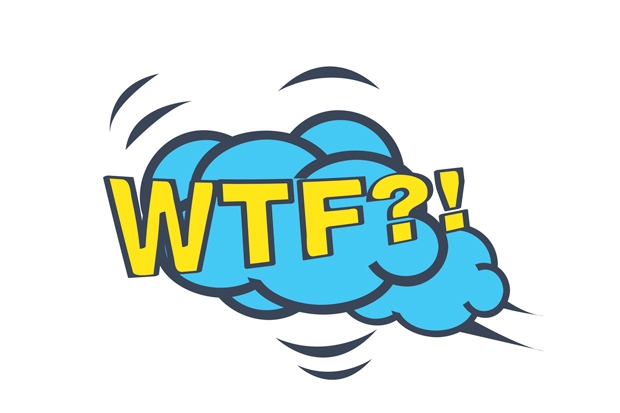Authors’ book tours are often fun but rarely easy. For me the long train journeys are a delight, but on arrival at bookshop or literary festival a doubt mars any pleasant anticipation: what are they expecting? Your likely audience has come for you rather than the book. Maybe that sounds conceited, as I’m hardly A-list, but I do excite a measure of (possibly morbid) curiosity. As to my audience’s interest in the book itself, well, they haven’t read it. It has only just been published. Their attitude tends to be neutral. How do I interest them?
My latest presents me with a particular challenge. As a personal anthology of abuse and invective, Scorn contains some very rude words. Every audience — metropolitan, provincial, radio or television — has different sensibilities. So two or three times a week I must guess on the basis of no prior knowledge how obscene are the words one may use without risk of offence or displeasure.
I get it wrong both ways. London is perfectly relaxed about wanker. Ashbourne, I can tell you, isn’t even ready for tosser; and in the rural Midlands teeth are sucked at cockwomble. Buxton, meanwhile (to my surprise) is entirely ready for fuck (‘Don’t worry, darling, at our age we’ve heard them all before,’ a nice elderly lady told me beforehand). The C word provokes gasps almost everywhere — but whether of excitement or outrage depends on the place and occasion, and you may be surprised to know that Chester was fine with it. My guess (though I won’t be testing this) is that London would not wish to hear the N word, but Matlock would shrug. Being gay I can probably get away with more homophobic abuse than (say) Jeremy Clarkson, and as I adore Virginia Woolf’s ‘the middle age of buggers is not to be contemplated without horror’, I make full use of my licence.
Channel 5’s The Wright Stuff at 9 a.m. is most emphatically not open to spunktrumpet (our producer made that clear beforehand); and I blotted my copybook grievously (and live) on BBC Radio 2’s Simon Mayo show at 6 p.m. by blurting out both cockwomble and spunktrumpet before I could stop myself. As I write this I’ve just been informed that I’m not to say these words on BBC Radio 5 Live, either. My pre-Christmas book tour, in short, is a journey across terrain strewn with pitfalls.
‘Well,’ you may say, ‘nobody’s asking you to take these risks. How about the time-honoured advice “If in doubt, don’t” — or, as my nana used to say, “Was that necessary, dear?” ’
But, Nana, it is necessary. Much of the material in this edition is new and one of the reasons for gathering it has been to take account of social media — and in particular Twitter — as a medium for verbal abuse. The European referendum campaign in Britain, like the US presidential elections, has offered me a rich treasury of rudeness to plunder. If we were to censor the vulgarity there wouldn’t be much left.
Besides, the profanity provides evidence for an argument I’m advancing. ‘Social media’ (forgive the tired phrase) appear to be looping idiomatic English usage back about four centuries, to a merry England in which unblushing delight was taken in the use of words and sounds to shock and amuse without too much regard for the actual sense or meaning of what is being said.
Shakespeare was a master of this. He could, of course, use language with the accuracy of a guided missile, but we should not overlook the almost childish glee with which he can launch words like rotten tomatoes rather than lethal arrows: words sometimes even made-up for sheer sound alone. Here’s a miscellany I’ve strung together:
‘You mad mustachio purple-hued maltworns!’, ‘leathern-jerkin, crystal-button, not-pated, agate-ring, puke-stocking, caddis-garter, smooth-tongue, Spanish pouch!’, ‘Thou drone, thou snail, thou slug, thou sot’, ‘breath of garlic-eaters!’, ‘whey-faced loon!’, ‘obscene, greasy tallow-catch’, ‘oh polished perturbation!’, ‘you Banbury cheese!’, ‘show your sheep-biting face’, ‘stale old mouse-eaten dry cheese’, ‘I will smite his noddles!’, ‘you whoreson upright rabbit!’, ‘you fustilarian! I’ll tickle your catastrophe!’
Every one of these jibes conforms to the 140-character limit for tweeting. And compare Shakespeare’s revelling in mindless, nonsensical rudery, with the Twittersphere’s response to a tweet this year from Michael Gove:
We need to renegotiate a new relationship with Europe, based on free trade and friendly cooperation. #Gove2016.
Mild and reasonable to the point of being anodyne, surely? But this appeared in the heat of Brexit battle, when people were feeling cross with Mr Gove. Here’s the response:
We had one and you helped destroy it; you are one confused bag of mince.
You can’t REnegotiate something NEW you boil-in-the-bag rent-a-clown.
Then what is the point of leaving, you incompetent ventriloquist-dummy-faced spunktrumpet?
That’s what we HAD, you reprehensible spam-faced tool bag!
I’m sure they’ll love that after all the lovely things your gang said about them you back-stabbing cockwomble.
Are you FUCKING KIDDING ME? We had one of those you haunted pork mannequin.
Something about senior male Tory MPs seems to get people going out there in cyberspace. From #CurseDavidCameron…
May you forever be plagued by rail-replacement bus services. May you stand on slugs in bare feet.
May you never be able to find the end of the Sellotape with ease, and may it always split when you do.
May you constantly forget about your tea until it is unpleasantly tepid.
And do you think, reader, I could get away with this one on the BBC — after all it is from Lord Byron …?
Posterity will ne’er survey
A nobler grave than this;
Here lie the bones of Castlereagh:
Stop here, traveller, and piss.







Comments